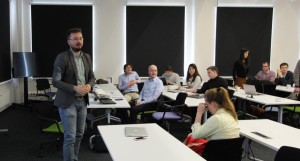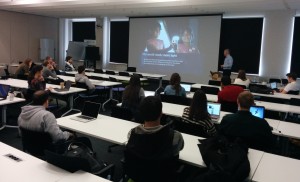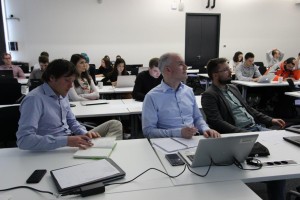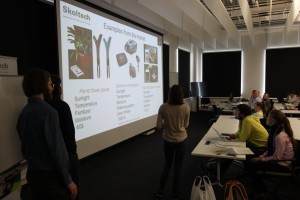One of the things that make Skoltech unique is the perception of commercialization as an integral part of its core, integrated with the education and the research. Traditionally there’s a gap between the research done in academic labs and the needs of the industry. At Skoltech we work to bridge the gap, and make the students take the market’s needs in account during and even prior to the research process.
 One of the ways of doing so, is Professor Zeljko Tekic’s course “Ideas to Impact: Foundations for Commercializing Technological Advances”. The course, master and PhD version is designed to help students develop the ability to find, evaluate, and develop technological ideas into commercially viable product and process concepts, and build those concepts into viable business propositions. The material covered is research and theory-based but the course is practice-oriented with much of the term spent on shaping technology-based opportunities.
One of the ways of doing so, is Professor Zeljko Tekic’s course “Ideas to Impact: Foundations for Commercializing Technological Advances”. The course, master and PhD version is designed to help students develop the ability to find, evaluate, and develop technological ideas into commercially viable product and process concepts, and build those concepts into viable business propositions. The material covered is research and theory-based but the course is practice-oriented with much of the term spent on shaping technology-based opportunities.
 In the last term, students enrolled in Ideas to Impact course experienced real-life industry innovation challenge, as they got an opportunity to work on a task provided by Philips Lighting, a global market and innovation leader in the lighting solutions. The students were divided into groups and asked to find new applications and services for Philips connected lighting systems for the smart home. At the beginning of the course, each group got one Philips Hue smart web-enabled LED home lighting system to explore its features and work on it. The challenge was held in a form of a contest, with a promise to award the winning team.
In the last term, students enrolled in Ideas to Impact course experienced real-life industry innovation challenge, as they got an opportunity to work on a task provided by Philips Lighting, a global market and innovation leader in the lighting solutions. The students were divided into groups and asked to find new applications and services for Philips connected lighting systems for the smart home. At the beginning of the course, each group got one Philips Hue smart web-enabled LED home lighting system to explore its features and work on it. The challenge was held in a form of a contest, with a promise to award the winning team.
Real immersion and benefit for the students came from the fact that from the beginning of the course they were in contact with scientists from Philips Lighting. Dr. Kars-Michiel H. Lenssen, director and principal scientist at Philips Lighting in the Netherlands, came three times during the term to Skoltech to work with students, listen to their ideas and provide feedback. Similar support to our students, but over video link, gave Dr. Marius Trouwborst, senior scientist at Philips Lighting. At the end of term, both of them came to Skoltech to see the final presentations and to declare the winning group.
(Assistant) Professor Tekic explains the structure of the process: “We wanted the students to think first divergent, to come up with as much as possible and as diverse as possible ideas. We did not want them to get stuck with the first idea they came up with, but to raise different ideas. That is why we pushed each group to present at least four different ideas in the midterm presentation, and then, based on their preferences and our feedback, each group was directed to work on application and service in different fields. We tried to do this to prevent repetition and overlaps, but also to try to explore all potential opportunities around connected lighting”.
“Basically, finding problems is more important than finding solutions”, he says, “because our students, as many students in Russia, especially technical students, are very good in finding solutions, when you can catch what is the problem. Here it is slightly different. It’s more important to find the problem, because finding the problem gives you the opportunity to work on something new. And that is what we focused on in the first step – trying to identify a problem”.

From left to right: Dr. Marius Trouwborst and Dr. Kars-Michiel H. Lenssen from Philips Lighting, and Skoltech Professor Zeljko Tekic.
After the final presentations, we talked with Dr. Lenssen, Dr. Trouwborst and Professor Tekic, to understand how this project evolved and how they sum it up. “We met for the first time a year ago, here at Skoltech, during the Startup Village”, said professor Tekic. “It was kind of a small networking after a presentation and we started talking about topics of common interest: co-creation and open innovation as well as about opportunities for collaboration between Skoltech and Philips Lighting. And then, because Kars-Michiel is frequently in Moscow, we met several times and came to the point of discussing how to start collaboration. Logical conclusion was – ok, let’s do something for students”.
Dr. Lenssen’s impressions: “What we like particularly about Skoltech is the combination with entrepreneurship and business. There are other universities that are very good in data science and hardcore mathematics, let’s say. I think here we really hoped for and found a combination of from one side technology – the best students from all over the CIS countries – and from the other side willing to make impact on society and entrepreneurship, and that is the link that triggered us. After discussion we decided to make this contest in correlation to the curriculum. Back home I talked with my colleagues and management and we concluded that we could be interested in this project. I would like to say that it’s thanks to Zeljko Tekic, that we had this opportunity. We met him, we came into discussion, but also he made it possible to have this contest very quickly”.
Dr. Trouwborst’s impressions: “I’m leading a project in services regarding home lighting. And there are so many interesting things happening in lighting, a revolution is ongoing as conventional lighting is changing to LED lighting. Because LED lighting is digital, it allows a full range of applications. There’s a lot of innovation done, and we at Philips Lighting do not want to do it all by ourselves, we want to work together with other companies and universities and talented students. That’s why we want to work together with Skoltech, to explore new opportunities, to work together and to find out what are the local opportunities here in the local markets in Russia”.
 Regarding the presentations, Dr. Trouwborst said: “We had quite interesting aspects which we heard today, so I think it was very good to see. The students really worked hard. In a couple of weeks they dived into one topic and explored the services it can do at home. I was impressed by the presentations I saw today”. Dr. Lenssen agreed: “I think that the presentations were quite good, compared with the average. That’s not in all universities. I think they did quite a lot in a relatively short time. We found this an excellent opportunity and we are very happy that it’s more than one short thing, one day or so. I think this was better than a short hackathon-like event, certainly very good for a start”, he said and gave a wishful glimpse at the future, “We hope that it leads to follow ups, more things like this and more cooperation”. One such possible cooperation is a suggestion made by Philips Lighting to give Skoltech students internships in their labs in the Netherlands.
Regarding the presentations, Dr. Trouwborst said: “We had quite interesting aspects which we heard today, so I think it was very good to see. The students really worked hard. In a couple of weeks they dived into one topic and explored the services it can do at home. I was impressed by the presentations I saw today”. Dr. Lenssen agreed: “I think that the presentations were quite good, compared with the average. That’s not in all universities. I think they did quite a lot in a relatively short time. We found this an excellent opportunity and we are very happy that it’s more than one short thing, one day or so. I think this was better than a short hackathon-like event, certainly very good for a start”, he said and gave a wishful glimpse at the future, “We hope that it leads to follow ups, more things like this and more cooperation”. One such possible cooperation is a suggestion made by Philips Lighting to give Skoltech students internships in their labs in the Netherlands.
Back to the competition. The winning group presented a service that uses the Philips Hue system to enhance the experience of reading, with an amusing and illustrative video. The group members Anastasia Stelvaga, Alexander Shkoruta, Denis Kolesnikov, Georgii Klushin and Vanja Vargek, got each a personal Philips Hue system. After the competition, members of the winning team gave us their impressions of the course and the challenge. Anastasia Stelvaga: “This course was the best entrepreneurial course among those I have taken (including few at MIT). The best point was a very close interconnection between theory and practice. All business frameworks which were given on lectures was lately implemented by us in practice. Secondly, the course outcome was very clear and reached: we learned how to find and evaluate opportunities around us. It was interesting to work with modern business problem. For me it was very motivating to know, that there is a chance that our idea can later be implemented by Phillips Lighting in real life”. Alexander Shkoruta adds: “I believe that Zejlko is one of those few instructors here who can actually involve students, not just forcefully feed them some stuff they are passively taking”.
